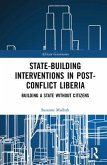At the turn of the twenty-first century, resilience has become a 'buzz-word' within fields as diverse as network engineering, ecosystems management, child psychology and military training programmes. Uniting these fields is a common problematic-how to provide security within environments characterized by radical contingency? Resilience has emerged as a response to this problematic. At its most general level resilience is understood as the capacity to absorb, withstand and 'bounce-back' quickly and efficiently from a perturbation. It is considered to be both a natural property and a quality which can be improved within a broad array of complex systems including critical infrastructures, ecosystems, societies and economies through proper governance. Utilizing empirical research to inform a biopolitical genealogy, this book represents one of the first systematic studies of resilience in the field of Security Studies. Rather than treating resilience as either a unified concept or technique of governance this book analyses resilience as an emergent security value. Utilizing a biopolitical analytic, this book demonstrates that the value of resilience has appreciated alongside transformations in the order of power/knowledge enacted by apparatus of security. Zebrowski argues that resilience was not lying in wait for the march of science to provide the conditions for its recognition. Nor was it concealed by the distortions of ideology which lifted with the culmination of the Cold War, that in fact there is nothing natural about resilience By drawing attention to the complex historical processes and significant governmental efforts required to make resilience possible this book aims to open up a space through which the value of resilience may be more critically interrogated.It will be of interest to students and scholars of international relations, security studies and conflict resolution.
The Value of Resilience represents one of the first systematic studies of resilience in the field of security studies. At the turn of the twenty-first century, resilience has become a 'buzz-word' within fields as diverse as network engineering, ecosystems management, child psychology and military training programmes. Resilience has emerged as a solution to the common problematic of radical contingency experienced across these fields. At its most general level resilience is understood as the capacity to absorb, withstand and 'bounce-back' quickly and efficiently from a perturbation. It is considered to be both a natural property and a quality which can be improved within a broad array of complex systems. Rather than treating resilience as either a unified concept or technique of governance, this book analyses resilience as an emergent security value. Utilizing a biopolitical analytic, it demonstrates that the value of resilience has appreciated alongside transformations in the order of power/knowledge enacted by political economies of security. Zebrowski argues that resilience was not lying in wait for the march of science to provide the conditions for its recognition. Nor was it concealed by the distortions of ideology which lifted with the culmination of the Cold War. There is nothing natural about resilience. By drawing attention to the complex historical processes and significant governmental efforts required to make resilience possible, this book aims to open up a space through which the value of resilience may be more critically interrogated. It will be of interest to students and scholars of international relations, security studies and conflict resolution.
Hinweis: Dieser Artikel kann nur an eine deutsche Lieferadresse ausgeliefert werden.
The Value of Resilience represents one of the first systematic studies of resilience in the field of security studies. At the turn of the twenty-first century, resilience has become a 'buzz-word' within fields as diverse as network engineering, ecosystems management, child psychology and military training programmes. Resilience has emerged as a solution to the common problematic of radical contingency experienced across these fields. At its most general level resilience is understood as the capacity to absorb, withstand and 'bounce-back' quickly and efficiently from a perturbation. It is considered to be both a natural property and a quality which can be improved within a broad array of complex systems. Rather than treating resilience as either a unified concept or technique of governance, this book analyses resilience as an emergent security value. Utilizing a biopolitical analytic, it demonstrates that the value of resilience has appreciated alongside transformations in the order of power/knowledge enacted by political economies of security. Zebrowski argues that resilience was not lying in wait for the march of science to provide the conditions for its recognition. Nor was it concealed by the distortions of ideology which lifted with the culmination of the Cold War. There is nothing natural about resilience. By drawing attention to the complex historical processes and significant governmental efforts required to make resilience possible, this book aims to open up a space through which the value of resilience may be more critically interrogated. It will be of interest to students and scholars of international relations, security studies and conflict resolution.
Hinweis: Dieser Artikel kann nur an eine deutsche Lieferadresse ausgeliefert werden.
Chris Zebrowski's brilliant book, The Value of Resilience, offers an analytically accomplished and historically informed critique of the seemingly benign idea of resilience. It unsettles the naturalness of this pervasive concept, tracing its origins from the emergency government measures of WWI through to today's preparations for an uncertain but potentially catastrophic future. Written in an open and accessible style, The Value of Resilience is essential reading for specialists and non-specialists alike, interested in how we are governed, and what we can do about it. - Mark Duffield, Emeritus Professor, University of Bristol, UK
Chris Zebrowski's brilliant book, The Value of Resilience, offers an analytically accomplished and historically informed critique of the seemingly benign idea of resilience. It unsettles the naturalness of this pervasive concept, tracing its origins from the emergency government measures of WWI through to today's preparations for an uncertain but potentially catastrophic future. Written in an open and accessible style, The Value of Resilience is essential reading for specialists and non-specialists alike, interested in how we are governed, and what we can do about it. - Mark Duffield, Emeritus Professor, University of Bristol, UK








